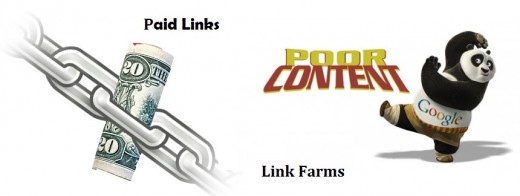Explaining Content Farms

Understanding
A Content Farm is not simply a site which publishes anything
A Content Farm is a writing site where crap writers submit articles that say nothing but trick Search Engines. A Search Engine, thinking the item fulfills the terms placed into the search box directs traffic to the site.
A Content Farm is where there is no intervention by moderators or owners to prevent this scam.
Advertisers
Yeah, most people don't even look at the Ads. Some Netizens load Ad blockers. But, advertisers pay the site to host the ads. And it is that money which is to pay YOU.
Advertisers are attracted to Sites which get a lot of traffic. Sites which get under 1M views a month are not interesting to the better advertisers. Those which get over that number per month start to look like the Super Bowl.
As you must know, Google owns Adsense, so the same site that supplies the Ads also supplies a lot of the views via Searches.
It seems pretty clear that a site which has Adsense Ads would have Google interest.
Search Engines
Search Engines make their name by being able to direct viewers to Sites that match their request. If you enter a term you expect a list of sites which fulfill your request.
You would be quite annoyed to get pages of advertisements or sites which are bad fits.
You would also be quite annoyed to click on a site which claims to fulfill your request and find rubbish. Lots of words which say nothing, but keep repeating the term you entered into that Search Box.
That is what a Content Farm is; a site which publishes items which say nothing. Sites which use the Search Term, over and again, but provide no information.

The Crap Writer
A Crap writer creates a 'Template'.
For example:
"All over the world people are talking about Gunk. You've probably been discussing Gunk. Some people are worried about Gunk. But there is no reason to be concerned about Gunk."
The Crap Writer checks 'what's trending' from an on-line search, and replaces Gunk with those words.
If the trend is 'back to school clothing' you can bet that every sentence will have that term. So:
"All over the world people are talking about back to school clothing. You've probably been discussing back to school clothing......"
On and on and on.
Some Crap Writers double up, so make a connection between the trending topic and something associated with it. It could be "school bags" or 'Extra lessons' etc.
There is no 'meat' and where links are allowed, you can bet they tie into some site to which the Crap Writer has a connection.
The over use of the keyword will pull a Search engine.
For if I use the term 'back to school' ten times in my article and the Crap Writer uses it sixty times, he'll come first and I may be way down on the 10th page although my article actually says something.
Why it Destroys a Site
The Crap Writer gets 100k hits. The Advertisers get upset. They have paid for nothing. The Search Engine has sent users to an item that should never have been published in the first place.
A Search Engine doesn't read the item, it isn't built for that. All it is built for is to locate articles concerning 'Back To School'.
The Crap Writer knows this, which is why the term is used in almost every sentence.
This one Crap Writer can have an entire site is then labeled a Content Farm, and everyone suffers.
This is because getting all those hits pushes the Crap to the front page. It isn't the best article, it is the one which, through use of the SEO term has gotten the most hits.
So Google, having noted the Crap on the front page of a site, labels it a Content Farm, and it automatically starts with 'minus' points so that if it appears in a search at all, it's on the last page.
Didn't Have to Be This Way
If publishing sites had human moderation, then Crap would be rejected immediately. But there is no human moderation. It is all A.I. and various tricks are used by the site to prevent earning.
This article has images which are two small, that article has bold faced words, on and on, never reading the item to deal with the actual content.
Had there been human moderation many sites would not have gone down. The first set of articles posted by Crap Writers would be their last attempt, because they wouldn't be published.
Had there been human moderation so many publishing sites would be up and paying today.
But short cuts, as we say in Jamaica, leads to long scars.








